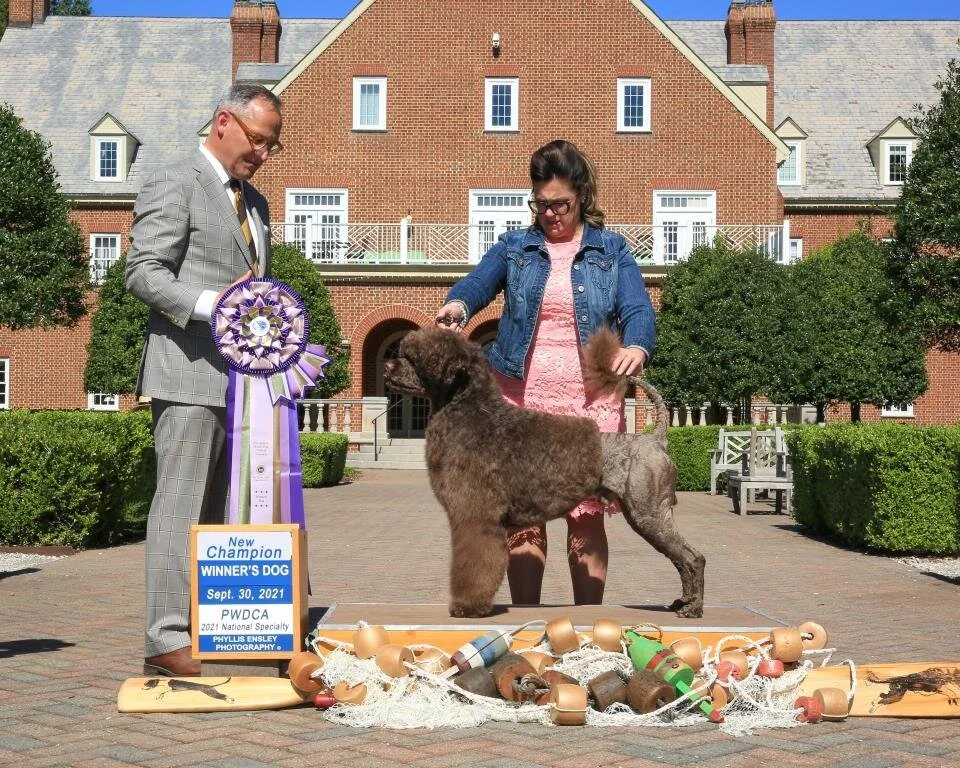BY KAREN
GERHARDINGER
MIRROR REPORTER
Emerging from the pond carrying a tennis ball, Basil shakes his curly coat and looks longingly at his master.
“Basil is absolutely spectacular,” David Swank said of the 11-month-old Portuguese water dog. “He’s got a brain, he’s flashy and he wants to please.”
Basil, whose official name is Mariposa’s Boss in Motion, and his sister Mariposa’s Cosmos Connection (Nysa) won Bred by Exhibitors and Best Bred By at the Chicago Portuguese Water Dog (PWD) Regional Specialty earlier this month.
In their Monclova Township home, David and his partner Scott Lenz operate Mariposa PWD – a full-time hobby that while not profitable, brings plenty of joy.
“A real true breeder never makes money,” David laughs. “We don’t do it for the money. We do it because we love dogs and we love the breed.”
When David was in high school, he was introduced to the world of dog obedience training and shows. His English springer spaniel was the top dog in the United States for obedience in 1976-77.
Fast forward to a decade ago, when David and Scott returned to the U.S. after living and working in Europe. David retired and got into English springer spaniels again. One of his first springers remains the breed record holder for champion titles, earning 25 in 15 countries.
The pair then did research on PWDs, which were known in southern Portugal for aiding fishermen in guarding the boats, bringing in the nets and catching errant fish.
Today, PWDs are loved for their personality, obedience and their ability to compete in water and on land agility courses. The breed is also used as a medical alert dog for people with conditions such as diabetes or epilepsy, and as therapy dogs for children and adults.
In 2008, the couple had Inara – who earned 12 champion titles in 10 countries, a world and European champion for her breed – serve as the foundation for Mariposa PWDs. Mariposa currently has a June litter on the ground, including four boys and one girl.
In a room that’s buzzing with fans and other sounds, the puppies snooze on carpets with a variety of textures, lounge on stuffed animals and occasionally step on baby toys that make noises.
“We introduce them to different sounds and surfaces at an early age. We are imprinting positive experiences they will remember as they go to their new pet parents’ homes,” David said, picking up a boy and cheerfully greeting him with baby talk.
From days three to 20 the pups are exposed to several smells, such as basil, lemon, leather and grass. They’re also held in different positions – upside down, vertical and on their backs – and their feet are tickled with Q-tips to jumpstart and stimulate their nervous systems.
All the Mariposa dogs are on a raw diet. Puppies are weaned starting at four weeks with ground turkey and goat milk. Before they leave, they are introduced to five other proteins. At Mariposa, they adopt a vaccination policy of less is better than more.
It’s an intense 10 weeks of training, getting the puppies ready for a permanent home, usually with someone who intends to use the dog for show or as a pet. But Mariposa PWDs try to keep the best from each litter to continue improvement in their lines.
“A lot of breeders go after the ‘dog of the day.’ But if 100 breeders are breeding to the same stud dog, you’ll reduce the gene pool. A few years down the road, you may discover health issues,” David said.
With each litter, the dogs are chosen for their abilities, although not every dog can be a champion, he said.
Education is key for Mariposa PWD. Regular posts on Facebook promote how to keep PWDs healthy and happy. Anyone interested in adopting a dog is strictly vetted. In order to be on a waiting list, applicants need to have a face-to-face visit at Mariposa PWD. If that visit goes well, the breeders require a small deposit toward the puppy price, and applicants become members of the Mariposa Facebook group.
“We get 15 to 20 puppy requests a week. We send a long e-mail explaining how we work, but 99 percent of the time, for various reasons, we don’t hear from them again,” David said.
For those who remain interested and involved, they are added to a waiting list for the next litter. And even after the dogs are adopted out, David and Scott follow them.
“We care about every dog that leaves here,” he said. “We are the pet parents’ lifelines for life.”
For more information, visit the Mariposa PWD Facebook page or visit www.mariposapwd.com.







